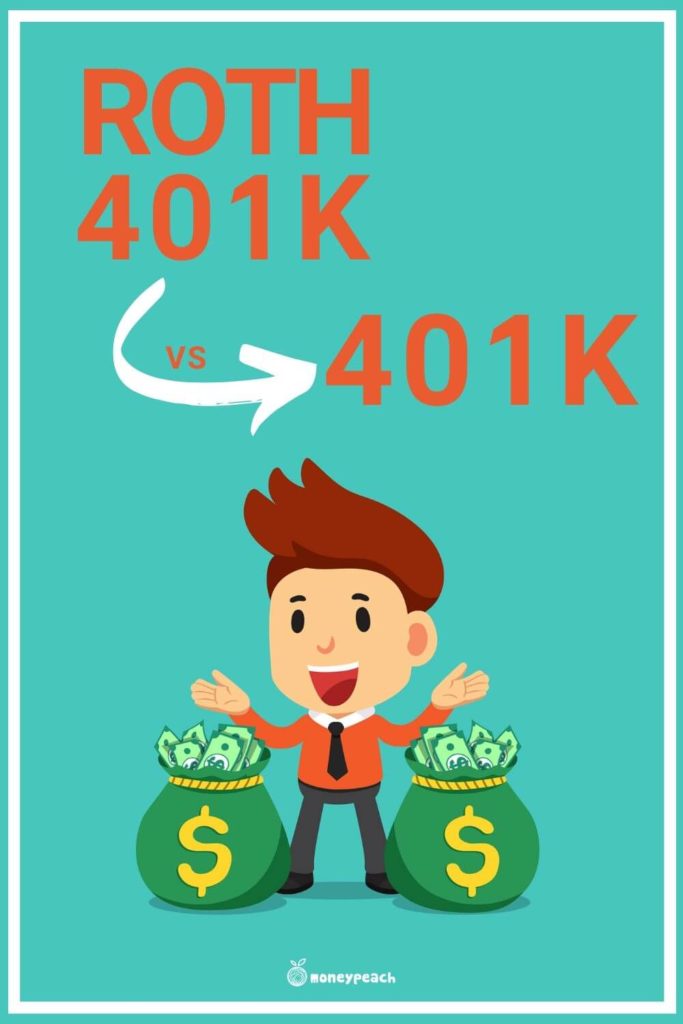Similar to a 401(k), a ROTH 401(k) is an employer-sponsored investment account for retirement. The main difference between a 401(k) and a ROTH 401(k) is how the savings are taxed.
This rules for the ROTH 401(k) also applies to the ROTH 457, ROTH 403(b) and ROTH TSP.
Savings into a 401(k) are invested using pre-tax dollars. The money going into the 401(k) is not taxed, it then grows tax-free, and taxes are paid on the withdrawals made in retirement.
However, a ROTH 401(k) acts just like a ROTH IRA. The investment is made with after-tax dollars, the investment grows tax-free, and then you do NOT pay any taxes when you withdraw the money in retirement.
Contents For This Post (Click to Open)
ROTH 401(k) Overview

The ROTH 401(k) is a combination of the traditional 401(k) and the ROTH IRA. Up until the creation of the ROTH 401(k) in 2006, the best retirement savings option for an employee would be to invest into the employer-sponsored 401(k) plan. In addition to the 401(k), an employee (or anyone for that matter) could also open up their own ROTH IRA and take advantage of after-tax retirement savings. However, there are some limitations to the ROTH IRA.
One limitation is the maximum amount you can save into a ROTH. In 2020, the maximum you can save into a ROTH is $6,500, with an extra $1,000 if over age 50. With the 401(k), the maximum you can save into a 401(k) is $19,500, with an additional $6,500 if over age 50.
There are also income limitations for the ROTH (see charts below).
| ROTH IRA AND INCOME LIMITATIONS - FILING SINGLE | |
|---|---|
| 2020 MAGI | Contribution Limit |
| Less than $124,000 | $6,000 ($7,000 if age 50+) |
| $124,000 to $138,999 | Begin to phase out |
| $139,000 | Ineligible for ROTH IRA |
| ROTH IRA AND INCOME LIMITATIONS - MARRIED FILING JOINTLY | |
|---|---|
| 2020 MAGI | Contribution Limit |
| Less than $196,000 | $6,000 ($7,000 if age 50+) |
| $196,000 to $205,599 | Begin to phase out |
| $206,000 | Ineligible for ROTH IRA |
| ROTH IRA AND INCOME LIMITATIONS - MARRIED FILING SEPARATE | |
|---|---|
| 2020 MAGI | Contribution Limit |
| Less than $10,000 | Begin to phase out |
| More than $10,000 | Ineligible for ROTH IRA |
Why a ROTH 401(k) vs a Traditional 401(k)?
It all has do with when you want to pay the taxes.
It all started off with the creation of the 401(k) in 1978. Section 401, subsection “k” of the IRS tax code created the ability for employees to defer some of their compensation from taxation until retirement.
Why Did The Taxes Matter So Much More Back Then?
If you go back to 1978 the United States looked a lot different. One of the biggest differences in 1978 vs 2020 is the federal income tax brackets. The highest tax bracket we currently have in the United States is 37%. For example, if you’re married/filing jointly and your income is over $622,050, you will pay 37% federal income tax.
However, if it was 1978, you would be paying 70% income tax.
Example: If you factor in inflation, someone making $100,000 in 2020 would be the equivalent of making $25,000 in 1978. The federal income tax rate for $100,000 in 2020 is 24%. The equivalent in 1978 would have been 45%.
What About Taxes Today?
Fast forward to 2020 and we pay a lot less in taxes than we did in 1978. However, when we invest into a 401(k) (or any pre-tax retirement account), we are using the same strategy of avoiding taxes now and paying them later.
Here’s the question to ask yourself: Do you think taxes will be higher or lower when you retire?
I can’t answer that question for you, but instead I can give some things for you to think about. First off, we are in one of the lowest tax rate environments in our history. Secondly, we have over 25 trillion in debt that will eventually need to be paid off. To put that in perspective, that is more than $200,000 owed per tax payer in the United States
The next question to ponder is whether or not you believe taxes will ever increase to pay off this debt while we are currently in an extremely low tax-rate environment? In my opinion, I think they will eventually have to increase over time.
ROTH 401(k) vs Traditional 401(k)?
ROTH 401(k) or Traditional 401(k)?
Since over half of employers who offer a 401(k) now offer a ROTH 401(k), I would almost always recommend a ROTH 401(k) over the traditional 401(k).
As someone who is just shy of 40 years old, my belief is taxes will eventually go up. Therefore, I would rather pay lower taxes now and avoid paying higher taxes later.
Note: This is merely my opinion and I have no way of predicting the future. No one does.
Frequently Asked Questions About the ROTH 401(k)
Now that you have an idea of why (or why not) you should choose the ROTH 401(k), here are some of the most common questions in regards to how the IRS has structured the ROTH 401(k).
Are There Income Limitations to the ROTH 401(k)?
No. Unlike the limitations with a ROTH IRA, there are not income limitations to the ROTH 401(k).
How Much Can I Save Into a ROTH 401(k)?
In 2020, the maximum you can save into the ROTH 401(k) is the same as the traditional 401(k) of $19,500. If you are age 50 or older, you contribute an additional $6,500.
In contrast, the maximum you can contribute to a ROTH IRA is $6,000 with an additional $1,000 if age 50 or older.
What are the Withdrawal Rules for a ROTH 401(k)?
Similar to the ROTH IRA, withdrawals on both your contributions and the growth are tax-free at age 59 1/2. However, any contributions made by your employer cannot go into the ROTH and are sent to the 401(k) where taxes will be due at withdrawal.
Example: If you saved $100,000 into your ROTH 401(k) and your employer matched you 5% during your employment, you would pay taxes on the 5% ($5,000) when you withdraw at age 59 1/2.
Also, withdrawals cannot be made within the first five years of saving into a ROTH 401(k). Therefore, if you think you may need withdraw from the ROTH 401(k) in less than five years from your initial deposit, you may want to think twice about the ROTH option.
Is there a Penalty If I Withdraw from the ROTH 401(k) early?
Yes, if you withdraw from your ROTH 401(k) before age 59 1/2, you will be subject to a 10% early withdrawal penalty. There are some circumstances where you can withdraw without a penalty, and those include (but not limited to) if the account owner becomes disabled or dies.
This is slightly different than a ROTH IRA since you can withdraw the contributions anytime (after you have held the account for 5 years) without paying a penalty.
Required Minimum Distributions
When you reach age 72, you are required to start making withdrawals from any pre-tax retirement account, including your 401(k). These are called required minimum distributions (RMDs).
The amount you are required to withdraw and pay taxes on each year is based on the amount you have in your retirement account and your life expectancy provided by the IRS. For those who intended to leave an inheritance behind through their retirement nest egg, this provides an obvious hiccup.
However, with a ROTH IRA, RMDs are not required, but with a ROTH 401(k) those RMDs are still in effect. The good news is you can easily avoid required minimum distributions by rolling over your Roth 401(k) to a Roth IRA.
Can I Convert My Current 401(k) to a ROTH 401(k)?
Yes, but you would have to pay the taxes on contributions into your 401(k).
Example: Let’s say you have saved $100,000 into the 401(k) and you are thinking about converting that to a ROTH 401(k). If you are in the 24% tax bracket, then you would have to write a check for $24,000 and then roll it from the 401(k) to the ROTH 401(k).
Note: I would never recommend using funds from inside your investment to pay the taxes for the rollover.
When Would I Want to Avoid a ROTH 401(k)?
If you are nearing retirement in a few years, you may want to reconsider the ROTH 401(k). Since you’re not allowed to withdraw from the ROTH 401(k) in those first five years, you may be better off with the pre-tax retirement account.
Final Thoughts
The ROTH 401(k) is often thought of as a hybrid from the 401(k) and the ROTH IRA. It combines some of the best features from both the ROTH and 401(k), to include higher contribution limits without income limitations.
The decision on whether or not to start a ROTH 401(k) should be based on when you want pay taxes on your nest egg. If you would rather pay taxes later in life, then the 401(k) is your best option. However, if you are looking for tax-free withdrawals in retirement, then start contributing to your ROTH 401(k) today.







2 Comments
Can you contribute to both 457 Roth and an individual through vanguard? For a total of 26,000
Thank you,
Mark
Yes! In 2022, you can contribute up to $20,500 (or $27,000 if 50 or older) to a ROTH 457 and then you can also contribute up to $6,000 (or $7,000 if 50 or older) to a ROTH IRA for a total of $26,500 (or $34,000 if 50 or older).